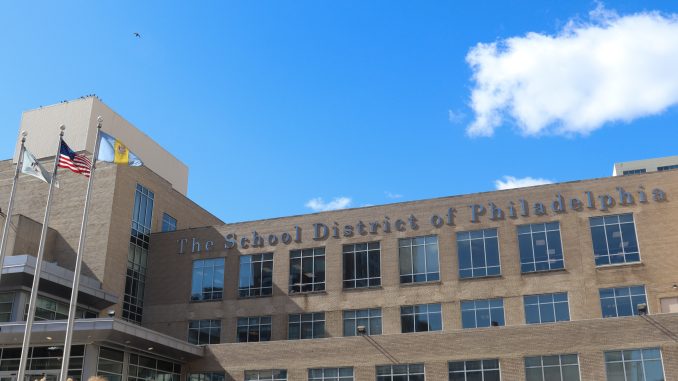
Temple is partnering with Heights Philadelphia and the School District of Philadelphia to launch the Temple Future Scholars initiative, an academic pipeline program offering support to students from middle school until college graduation.
The program launched on Feb. 22 in a ceremony at the Temple Performing Arts Center with an inaugural class of 120 students across seven middle schools in the North Philadelphia area.
The Future Scholars class of 2034 will attend Saturday College programming on Main Campus throughout the year and a summer camp with mentors and different activities. All accepted participants in the program are receiving a full tuition scholarship to Temple, should they choose to enroll.
“Now they’re having opportunities to step on campus and see what makes Temple so special,” said Destinee Harper, associate director of college pathways at Heights Philadelphia. “It’s really just magical actually, to think that these students who are essentially in [Temple’s] backyard are able to get a taste of what it is to be a college student at a great institution like Temple.”
Jose Aviles, vice provost for enrollment management, began to develop the program with the School District of Philadelphia a year ago. Heights was included in the conversation once they decided on a plan to launch the program at various middle schools.
“Securing the students, that was the easy part,” said Chris Avery, vice president of strategy and partnerships at Heights Philadelphia. “The next part is, what happens? [Students] come every month, over the summers, staying with their life, engaging with [us], advising [them]. It really takes a village. It’s a village of the district, the university, our organization, the foundation work, to make this possible for the kids that we serve.”
Heights Philadelphia currently works with Temple on the Cecil B. Moore Scholars Program and Temple Promise, which offers similar academic and financial support. Cecil B. Moore Scholars supports high school seniors while Future Scholars begins in seventh grade. The inaugural Cecil B. Moore Scholars class is graduating from Temple this year.
Future Scholars students aren’t required to go to Temple, and the university is aware that some may end up going to other Philadelphia and state schools like Drexel University, the University of Pennsylvania, Pennsylvania State University or the University of Pittsburgh, said President John Fry.
“The idea of pipelining is that not only is it a social good that we should be doing as part of our mission, but we’re also getting them familiar with Temple at an early age, coming back and forth on our campus,” Fry said. “One day they’ll wake up and say ‘That’s where I want to be, I want to be an Owl.’”
The program includes Mary McLeod Bethune School near Temple’s Health Sciences campus, Paul L. Dunbar School and Tanner. Duckrey School near Temple’s Main Campus, the Russell Conwell School in Kensington, the John F. Hartranft School in North Philadelphia, Morton McMichael School in Mantua in West Philadelphia and Juniata Park Academy in North Philadelphia.
“As a good neighbor, we do see a special commitment to the local community, so that we impact it positively both from an economic perspective and also from an educational perspective,” said Valerie Harrison, vice president for community impact and civic engagement. “There is a commitment throughout the commonwealth to the students of all over Pennsylvania, but we are seeking to be good neighbors and to really be an economic engine in North Philadelphia.”
Though Temple is the first university in Philadelphia to launch a community mentorship program, the basis of the initiative comes from the Rutgers University Future Scholars program. Since 2008, Rutgers has accepted more than 200 first generation students in their surrounding communities each year, giving them similar academic programming and zero tuition costs if the students attend Rutgers.
Temple students, faculty and members of the Heights Philadelphia organization will help host the student sessions at Temple on Saturday mornings in February, March and April, with planned activities and classroom lessons. Since the program pulls from different schools, kids will get a chance to meet and interact with peers across various parts of the city.
“They’re stuck with us until they graduate, but they’re going to build that camaraderie that a lot of students don’t really have prior to going to college,” Harper said. “They’re getting that college exposure being on a college campus every Saturday, meeting mentors who are college students from their neighborhoods, it’s like, come on, it’s such a great program for these students.”


Be the first to comment